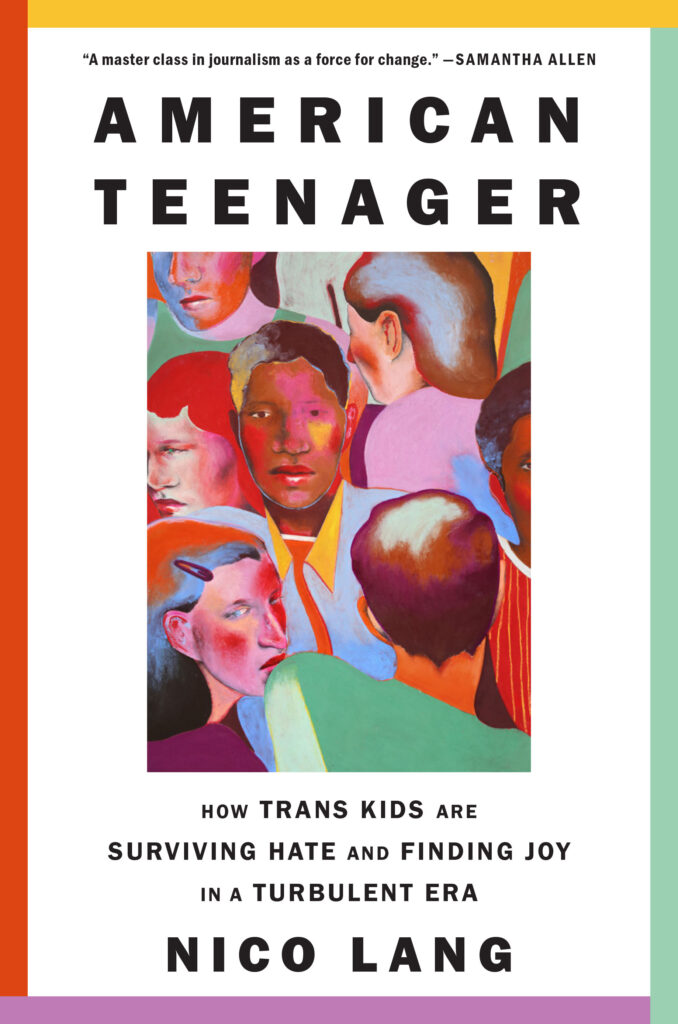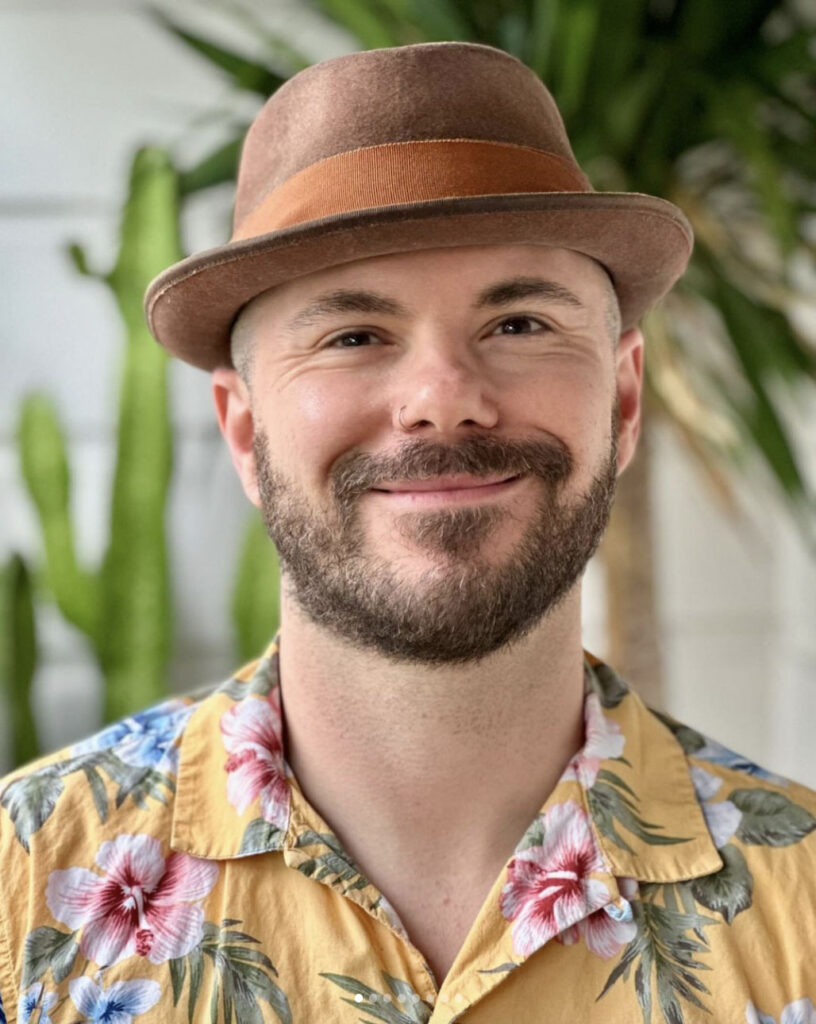Our interview with American Teenager author, Nico Lang
by Tricia Dewey

I caught up with Nico Lang by phone while they were on their first stop of a 19-city book tour in late September. Their new book, American Teenager: How Trans Kids Are Surviving Hate and Finding Joy in a Turbulent Era, was just published October 8. Talking about the impetus for the book, they said, “I really wrote this book because I knew that I could. I knew that it needed to exist.”
In American Teenager, Nico Lang, a long-time and accomplished journalist, tells the stories of eight trans teens from seven states over the course of nine months between 2022 and 2023. Lang spent a total of one hundred hours with the families and teenagers visiting schools, hanging out with their siblings and parents, attending prayer services, eating sushi, listening to music, and everything in between.
Lang develops rapports and relationships that translate into the stories of these teen’s everyday lives. The teens talk about their friends and families, hopes and dreams, and passions. No topic was too big or too small. The humanity and empathy that good storytelling can bring shine through in Lang’s writing and descriptions.
In the introduction, Lang lays out the background for the grim and dangerous state of affairs currently facing the transgender population in the United States. They reported that in 2023, approximately 725 bills negatively impacting the rights of LGBTQIA+ Americans were introduced in state legislatures. According to NBC News, 2023 holds the record for the largest number of anti-queer legislatures in a single year.
Tennessee is familiar territory for this slate of hate, and according to the Human Rights Commission, actually leads all states with 24 anti-LGBTQIA+ laws passed since 2015, including a ban on gender-affirming medical care to minors that prohibits puberty blockers, hormones, and medicine. Trans K-12 kids in Tennessee are banned from playing sports and from using the bathroom and locker room that align with their gender.

As a journalist, Lang said that until the anti-trans legal movement got rolling, they had talked themselves out of writing this book. They said, “There was a part of me that had always tried to be a little empathetic if people have certain questions about things; if people have questions about medical care or questions about what the right age to let somebody socially transition is. These are discussions we can have. These are things we can talk about. These are things we can educate people on.”
In 2021, when they saw the bills in Texas that were trying to criminalize parents of trans children as child abusers if they simply allowed their kids to socially and medically transition, things changed.
As Lang noted, “When we’re starting the discussion from a level of ‘parents of trans youth are child abusers,’ we’ve lost any good faith that we can work with them.”
American Teenager is much more than a litany of the effects these laws have on trans and gender-nonconforming teens. Lang always believed in the power of education, so they began to formulate the book with some of the teens and families they already knew and reached out to other families they didn’t know, as well.
Lang says they felt that it was really important to expand representation in every way and tell different kinds of stories that hadn’t been told. They felt that the anti-trans bills gained traction because politicians were able to dehumanize trans kids.
Lang said, “They [the politicians] often pretend that they [trans kids] don’t even exist. So, we need as much storytelling as we can get right now to show that these kids do exist. They are leading full, authentic lives. And they are harmed by these policies. We see in this book how profoundly these kids are hurt by what the politicians are doing to them.”
Lang does both in-depth reporting and storytelling in the book. They wanted to tell the story of the anti-trans legislation and its effects but also a more nuanced and complex narrative about the lives of the kids it impacts. Because of the thoroughness of this coverage it’s almost impossible to summarize the teenagers’ Lang profiles.
Wyatt, in Sioux Falls, South Dakota, teaches ballet, writes poetry, advocates somewhat reluctantly for trans rights, is interested in learning American Sign Language, and came out to their parents by writing them a note at age ten that began with “I love you so much.”
Wyatt expressed loneliness when asked about being trans in their community, “For trans kids, it’s this never-ending loop where we’re dealing with hard things, and we don’t necessarily get the grace that somebody else would. It is just our lives. We have to learn how to deal with that loneliness because it’s never necessarily going to go away.”
There is Rhydian from Birmingham, who finds out they will have to wait longer for their top surgery. They were bullied at their former school, attended Magic City Acceptance Academy (MCAA), the only explicitly LGBTQIA+ affirming school in the South, and began their LGBTQIA+ journey at age 11.
And then there’s Mykah in Charleston, West Virginia, Ruby in Houston, Clint in Chicago, Augie and Jack in Pensacola, and Kylie in Torrance, California. There are some similarities among several of the stories; for instance, many of the kids are described as “older than their years.” Lang describes a positive shift in their personalities following their transitions, but mainly, what stands out is how different every story is. In writing this book, Lang was reminded of how difficult it is to be a teenager and that these kids are no different: it’s always tricky to figure yourself out. They also wanted to draw out the differences between the kids to show their uniqueness.
Lang expertly constructs the seemingly disparate narrative of the kids’ everyday existence into cohesive wholes. They knew that the book needed to start with the humanity of trans people, explaining, “Trans folks are humans the same way that you are. They have wants and desires and needs the same way you do, and that goes for kids as well. I wanted to begin with the basic humanity of these kids. Sadly, I wanted to explain that these kids deserve love; they deserve happiness, and they deserve to lead self-determined lives because I feel like we’re often not stating that in the discussion because maybe we feel like we don’t have to. Clearly, we do have or else you wouldn’t see these kinds of bills or laws that are being propagated.”
Lang knows that one book isn’t going to change everything, but they feel that as journalists, they have to at least try. They said, “My goal as a journalist is to inform and educate, and I don’t think that I could be a good educator without writing this book. I did everything in my power to make sure that it did exist and people had this resource now.”
Throughout the book, they also wanted to surprise people, hoping to deliver a book that was not exactly what people might expect. With American Teenager, Nico Lang succeeds on all fronts in this engrossing and ultimately life-affirming collective portrait.



